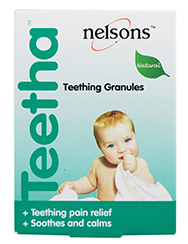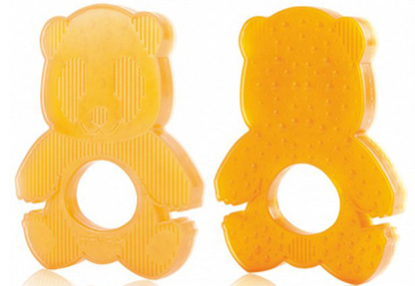Help for teething princesses (and other babies)
With Princess Charlotte likely to cut her first teeth around now, there are lots of tips about how to help teething babies. Many people recommend gels that contain numbing local anaesthetic (usually lidocaine or benzocaine), but the US Food and Drug Administration (FDA ) has warned against using these products, except under the advice and supervision of a healthcare professional, because they have hurt some children. Here are some more natural options…
 ● Natural, drug-free teething gels are available, including Earth’s Best Organic Teething Gel (£7.99 for 9.4 g (www.amazon.co.uk), which includes liquorice, peppermint oil, fennel, vanilla and camomile and is sugar- and lactose-free. Nelsons Teetha homeopathic granules with camomile dissolve in a baby’s mouth (£4.95 for 24 sachets, www.victoriahealth.com).
● Natural, drug-free teething gels are available, including Earth’s Best Organic Teething Gel (£7.99 for 9.4 g (www.amazon.co.uk), which includes liquorice, peppermint oil, fennel, vanilla and camomile and is sugar- and lactose-free. Nelsons Teetha homeopathic granules with camomile dissolve in a baby’s mouth (£4.95 for 24 sachets, www.victoriahealth.com).
● Cool (not freezing cold) sugar-free drinks help soothe gums; water is the best option.
● Gently rubbing gums with a (clean) finger can soothe discomfort.
● Teething rings or wet clean flannels, briefly cooled in the fridge, can also be comforting. But always supervise babies so they don’t accidentally choke, warns the FDA .
 ● Hevea Panda Teether is a multi-award-winning, 100 per cent natural rubber teether, which is easy to grip and encourages a baby’s natural gnawing action. The one-piece design prevents bacteria accumulating. Widely available online from £10.
● Hevea Panda Teether is a multi-award-winning, 100 per cent natural rubber teether, which is easy to grip and encourages a baby’s natural gnawing action. The one-piece design prevents bacteria accumulating. Widely available online from £10.
CARERS AT CHRISTMAS
The Christmas holiday is a chance to relax and recharge but this is often not the case for carers. Macmillan information nurse John Newlands says, ‘It may be difficult, but it is important to take a few days off. It will help you and the person you are caring for. Nearly half of people who are looking after a loved one with cancer suffer from stress, anxiety or depression.’
Macmillan has an ongoing campaign to ensure that all those caring for someone with cancer get the support they need. Visit www.macmillan.org.uk/carers for more information. Of course, Macmillan’s aims and advice apply to carers looking after people with other physical and mental health conditions too.
Here are John’s tips for carers on taking a break at Christmas and during the coming year.
• Arrange a long weekend away or even a stay cation on your own. Family and friends would often like to help so don’t be afraid to ask. Even a day where you get out with friends and do something different can help.
• Speak to your local authority or carers’ centre which can carry out a carer’s assessment to determine your need for carer breaks. You may be eligible for respite support as part of a wider package of help. (Demand for respite care is high during peak holiday times so apply early.)
• Charities such as Carers UK (www.carersuk.org) may be able to offer you support to take a break. Macmillan provides grants for people with cancer to help fund a UK holiday and this can cover their carer or partner too.
• If you do travel with the person you are caring for, take an adequate supply of prescription drugs and a written record of all medicines and treatments with you.
TACKLE AN ITCHY SCALP HEAD-ON
 A reader whose bald-headed husband has been ‘driven mad’ by a painful itchy scalp writes to recommend Carina Organics Botanical Therapeutic Shampoo & Body Wash (£21 for 500 ml/ www.victoriahealth.com). ‘His doctor prescribed tar shampoo which didn’t help at all and also smelt disgusting. Botanical Therapeutic Shampoo is not a miracle cure but has definitely helped keep the inflammation under control and his head looks far less red and is no longer tender.’ Another reader says it has worked well on her husband’s flaky dry scalp. (What is it with husbands and hair?)
A reader whose bald-headed husband has been ‘driven mad’ by a painful itchy scalp writes to recommend Carina Organics Botanical Therapeutic Shampoo & Body Wash (£21 for 500 ml/ www.victoriahealth.com). ‘His doctor prescribed tar shampoo which didn’t help at all and also smelt disgusting. Botanical Therapeutic Shampoo is not a miracle cure but has definitely helped keep the inflammation under control and his head looks far less red and is no longer tender.’ Another reader says it has worked well on her husband’s flaky dry scalp. (What is it with husbands and hair?)

